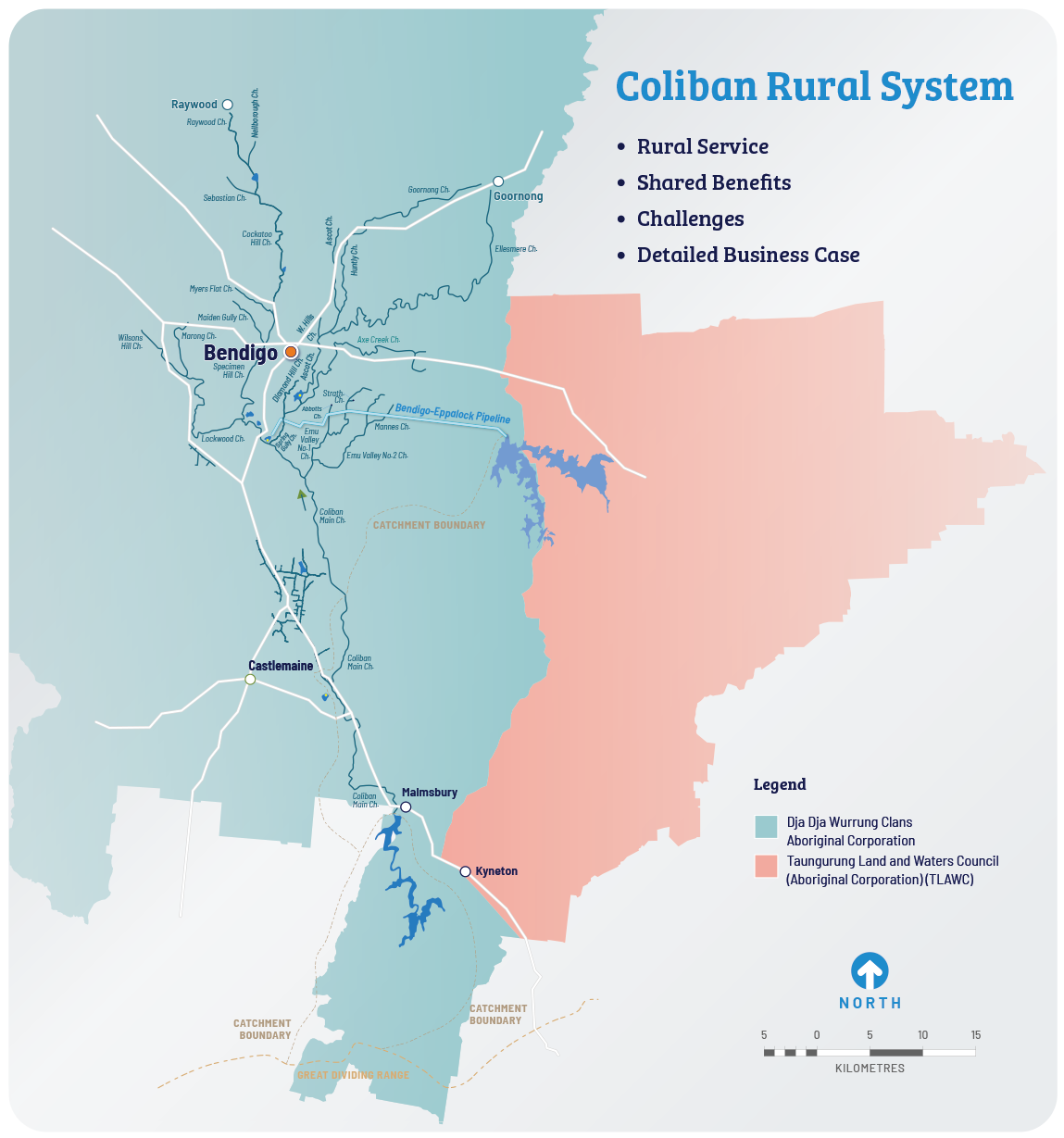A sustainable rural future
As part of the development of this important project we're continuing to investigate what the future of our rural water supply network could look like. We have a unique opportunity to access Federal funding to update our ageing and inefficient rural channel system. It is important that we continue to provide you with information so that you are up to date about the progress of the project and can make informed decisions about your level of involvement when the time comes.
Continuing to operate the current system is not sustainable and we cannot continue to accept the significant water losses suffered by the existing outdated and failing channel infrastructure.
Background
Background
In August 2023, we welcomed a $3.7 million investment announcement by the Australian Government to develop a Detailed Business Case for a more efficient rural channel system. The funding complements our $2 million investment in the project.
The Coliban Water rural network supports lifestyle, agricultural and primary industry through 12 rural supply systems, comprising 360 kilometers of channels and 140 kilometers of pipelines. We typically supply between four and seven gigalitres of raw and recycled water to rural customers each year.
Originally built to supply the former booming mining industry and associated services, our rural water network is an ageing and leaky system that can now often be found passing through growing urban areas. In its current configuration it does not always support what’s best for the region.
The channels are largely unlined and inefficient. 79%, or an estimated 4 gigalitres, of water is lost each year due to leaks and seepage in both the Coliban Water channel and private channel networks.
Building on the work completed in the Preliminary Business Case in October 2022, this investment will support engagement work with our rural customers to develop options to update the rural network.
These options will improve customer service levels and provide greater water efficiency, as well as delivering significant water savings and better environmental and cultural outcomes.
Investigations
Investigations
Technical investigations will be completed for each of the relevant channel systems. The findings will be combined with customer feedback and a range of options identified. These options may include:
1. Modernisation – Replacing the existing channel system with a modernised rural piped supply.
2. Reconfiguration –A mix of new pipelines and upgrades to sections of the existing channel system.
3. Alternative supply – Connecting some customers to the town water or recycled water systems.
4. Rationalisation – Reducing or removing parts of the network that are no longer needed or underused to avoid overinvesting in assets with limited future value.
We anticipate we will have a better understanding of the options for each channel system after stage 2B of customer consultation. While these investigations and customer conversations are underway, we do not anticipate any major changes to existing rural arrangements.
We have implemented some interim policy positions to support the investigation period that relate to new licences, licence renewals and permanent water trading. More information is available via the 'Resources' tab on this page and access 'Policy update May 2025'.
Customer Engagement
Customer Engagement
As we develop the business case, we’re seeking ongoing feedback from customers who currently use the network to help us build a strong case for project funding. We are doing this in stages:
Stage 1 (complete)
In Stage 1 we asked customers to complete a questionnaire to get an indication of how they are currently using the system and what their future plans are.
Stage 2A (complete)
This stage focussed on getting customers to indicate what preference they would choose if there were incentives available for them to reduce their licence volume.
Stage 2B (current)
The focus of this current stage is to continue to provide information that gives customers a greater understanding of how the project is likely to affect them. We want customers to have information available that enables them to make informed decisions when the time comes.
Throughout the project we will continue to seek advice from our Rural Customer Advisory Group (RCAG).
Resources
Document Library
Rural Customer Advisory Group
Rural Customer Advisory Group
Made up of nine representatives from across the rural system, this group meets quarterly and helps us understand rural customer needs and experiences. Members include:
- Brian Stephens & Paul Mannes - Eppalock Pipeline
- Malcolm Burrows - Harcourt
- Charles Thompson & Jon Vercoe - Specimen Hill
- Mark Browne - Ascot
- Jeremy White & Michael Chalkley - Emu Valley
- Ray Hope - Lockwood
We are currently looking for representatives for Spring Gully, Cockatoo Hill and Axe Creek systems. Please call Darren Heritage on 1300 363 200 to find out more about getting involved.
Coliban Rural System







